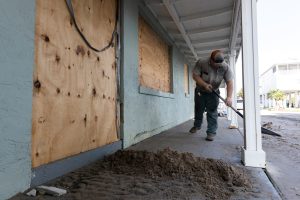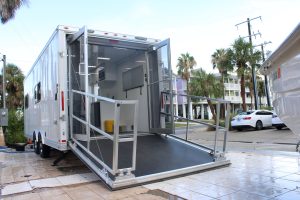One year ago this week, Hurricane Idalia made landfall in Florida’s Big Bend region. In addition to contributing to the deaths of 12 people, the Category 4 hurricane generated storm surge as high as 12 feet and winds as strong as 125 mph. Foundations flooded, and roofs toppled.

At the UF/IFAS Nature Coast Biological Station (NCBS) in Cedar Key, Idalia churned up water that flooded the former motel adjacent to the station’s main structure. NCBS staff and students had used the motel’s rooms as a lab, but the water destroyed some of their electrical equipment and swept other equipment away. Waves tore apart the station’s wood-plank boat dock.
“It was a horrible storm surge, and we had close to 5 feet of water on the first floor of the station, with high wave energy,” said Mike Allen, NCBS director.
In the year since the storm, NCBS staff have adapted to boost the station’s resiliency. They now store equipment on shelves in shipping containers. They’ve replaced the dock with porous fiberglass boards that allow waves to pass through.
But foremost among changes at the marine research facility is the purchase of a new mobile lab. Now scientists conduct research inside the trailer, which is parked on the foundation of the razed motel. It has a bathroom, A/C and refrigeration. A back ramp facilitates the rolling of coolers full of specimens right up to microscopes on the counter. There’s space to accommodate three or four scientists at once.
“It’s built really well, and it suits our needs perfectly,” Allen said. “It’s great that we can pack that thing up and get it off the island and then, two days later, move it back in here, and people can continue their work.”

The NCBS partners with the United States Fish and Wildlife Service, which allows the station to store equipment and vessels 18 miles inland at the Lower Suwannee National Wildlife Refuge.
All these adjustments mean the NCBS is better positioned to withstand violent weather and to recover quickly after it strikes, Allen said.
“In these coastal areas where flooding is becoming more and more of a problem and these events are becoming more and more likely, we’ve learned it’s important to modify operations so you can be mobile and get equipment out of harm’s way when you need to without disrupting your work too much,” he said.
The most recent hurricane to hit the NCBS left the station with significantly less damage than Hurricane Idalia. A week after Hurricane Debby’s Aug. 5 landfall, workers swept sediment from the NCBS parking lot. Just one piece of siding was missing from the station’s main structure, a three-story building.
Aside from some minor inconveniences, however, research largely resumed without delay once Debby had passed.
“It wasn’t too bad — mainly because we learned so many lessons from Idalia,” Allen said.
Tour the mobile lab – as well as the NCBS Discovery Center – Oct. 19 and 20 during the Cedar Key Seafood Festival.
###
ABOUT UF/IFAS
The mission of the University of Florida Institute of Food and Agricultural Sciences (UF/IFAS) is to develop knowledge relevant to agricultural, human and natural resources and to make that knowledge available to sustain and enhance the quality of human life. With more than a dozen research facilities, 67 county Extension offices, and award-winning students and faculty in the UF College of Agricultural and Life Sciences, UF/IFAS brings science-based solutions to the state’s agricultural and natural resources industries, and all Florida residents.
 0
0
